
Issue 207
July 2024
Discover the unique and powerful bond sibling fighters bring to the UFC, expertly chronicled by E. Spencer Kyte.
Over the years, a host of siblings have each made the walk to compete inside the UFC Octagon, with the tandems ranging from wildly popular and largely successful to complete unknowns unable to capture a single victory.
The most famous siblings to ever grace the UFC cage are probably the Diaz Brothers, Nick and Nathan. This pair of mumbling misanthropes from Stockton believe everyone is against them, fights should last until one person is physically incapable of continuing, and they are, to this day, the undisputed best fighters walking planet Earth.
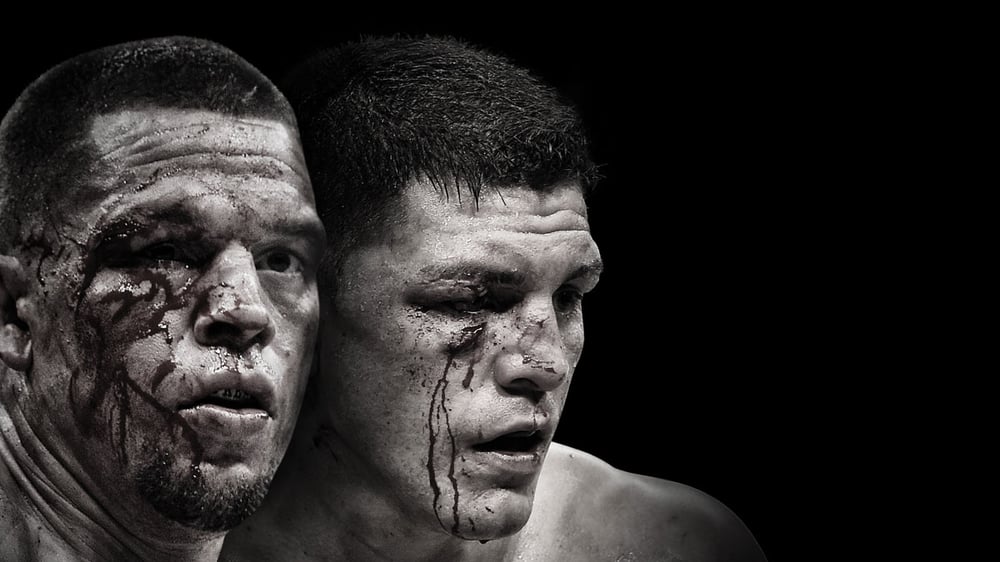
We have had adopted siblings (Ken and Frank Shamrock) and half-brothers (Matt Anderson and Jeremy Horn), as well as one brother-and-sister combination — Mizuki and Naomi Inoue — and one set of sisters, former flyweight queen Valentina Shevchenko and her elder sister Antonina.
Marriage made Tyson Pedro and Tai Tuivasa in-laws, and both made their way to the biggest stage in the sport. At the same time, Stephen “Wonderboy” Thompson and Chris Weidman were already standouts in their respective divisions before Thompson’s brother Tony married Weidman’s sister Colleen tied the knot, making the two-time welterweight title challenger and ex-middleweight ruler brothers-in-law as well.
SIBLING SUCCESS
Regarding the number of victories, the most successful brothers to compete in the UFC are the Miller Brothers, Dan and Jim. However, that should be obvious given that Jim is the all-time wins leader in UFC history with 26 victories and counting. The Diaz Brothers hold second place with 22 combined wins, while Anthony and Sergio Pettis take the bronze medal with 20 victories.
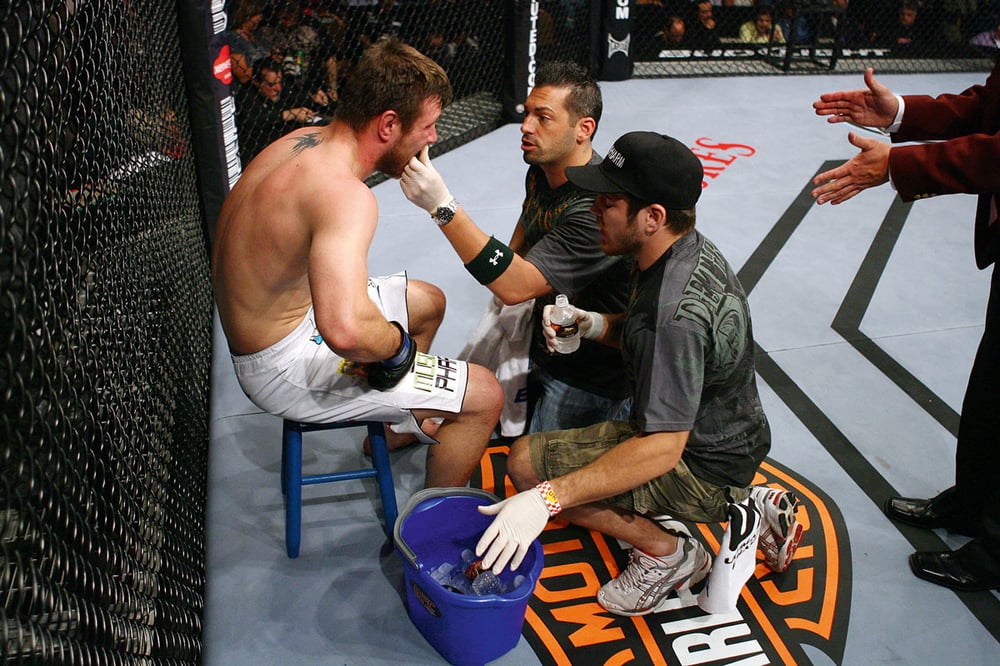
The least successful sibling tandem in UFC history? Ashkan and Suman Mokhtarian went a combined 0-5, putting them two losses ahead of Danillo and Yuri Villefort, who landed on the wrong side of the results in all three of their trips into the Octagon.
There are some ‘bet you didn’t know’ instances of famous fighters having siblings that also competed in the UFC, including former welterweight champs Matt Hughes and Matt Serra, whose brothers Mark and Nick each made a lone appearance inside the eight-sided proving ground; Hughes earned a victory, Serra did not.
To get a sense of what it’s like competing at the highest level in the sport alongside your sibling, Fighters Only reached out to two pairs of brothers who are not only currently fighting alongside one another in the UFC but doing so in the same division — heavyweights Justin and Junior Tafa, and bantamweights Javid and Farid Basharat.
TAFAS VERSUS THE REST
Justin and Junior Tafa sit in the middle of a four-pack of brothers; Gerard is the eldest, and Lorman is the youngest.
While they were competitive with each other growing up, then — as now — the philosophy when it came to fighting was ‘Tafas versus the rest.’
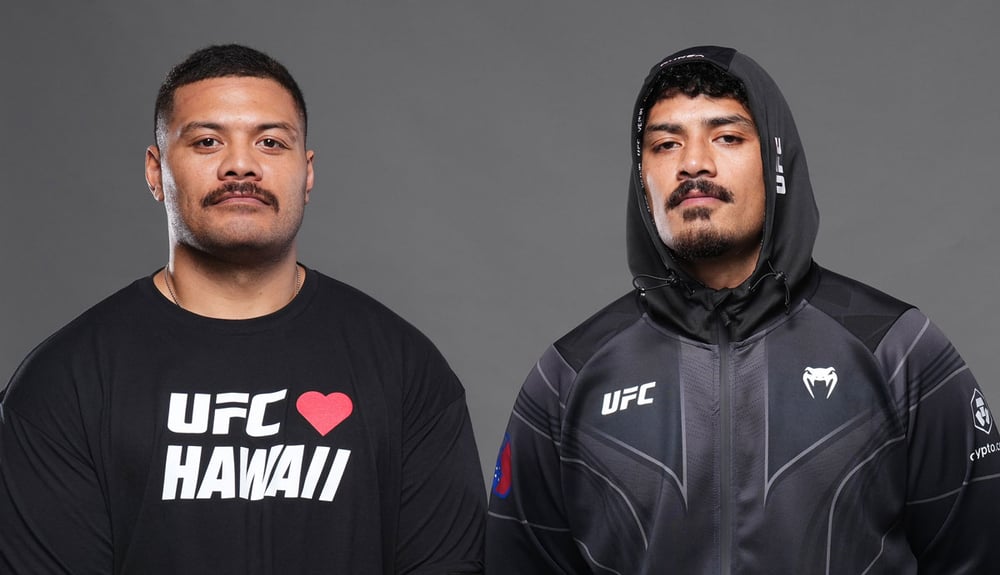
“I think we have more beef over who ate the food in the fridge than who wins the sparring rounds,” laughs Justin while driving back from a training session with Junior riding shotgun, leaning in and out of the frame depending on whether he’s speaking or not. “We understand the fight game. We keep each other honest. We know that if we get bashed one round, it’s all good.”
“We were just good at scrapping other people,” continues the elder of the two, who was the first to touch down in the UFC, debuting at UFC 243 in Melbourne and having amassed a 4-4 record with one no-contest through his first nine trips into the Octagon. “We varied in age, so if someone was a bit too young to bash, we had our younger brother that could bash for us.”
The pair smiled and chuckled at the memory and suggestion that they had someone to fight at every age range when they were younger, though tapping in another member of the Tafa Gang was no longer something confined to their scrappy childhood days.
Earlier this year, Justin was scheduled to fight Marcos Rogerio de Lima in a preliminary card bout at UFC 298 in Anaheim, California, but he suffered an injury in the days leading up to the event. With the Brazilian veteran needing an opponent, Junior, who was in town cornering his brother and preparing for his own fight the following month against Karl Williams, stepped in.
A couple of weeks later, Junior was unable to compete due to the bumps and bruises incurred in the clash with de Lima. A healed and recovered Justin returned the favor, sliding in for Junior opposite Williams.
“When an opportunity like that arrives, it’s hard to turn it down,” says Junior, explaining there was no hesitation in stepping up to replace his brother in February. “I got the phone call, and next thing you know, I was on the scales with my shirt off. That’s Tafa Gang for ya!”
“It’s surreal,” he adds when asked about competing alongside his older brother on the biggest stage in the sport. “It’s like a real-life Tekken. My dog, my brother, we fight the best fighters around the world. It’s crazy.”
“We take it in when we do,” says Justin, adding his thoughts on the matter. “Sometimes we’ll have a beer somewhere and just be laughing at where we are, but we know this is just the beginning. My brother just got to the UFC last year. We’ve still got a long way to go, a long path to set, a lot more heads to knock. We want to go down as the baddest brothers to ever just step in the Octagon; we want to be in the Hall of Fame for that.”
Before they get to the Hall of Fame, the Tafa Brothers each have to get things moving in the right direction again, with Junior losing to de Lima and Justin falling to Williams.
Junior is slated to return at UFC 305 in Perth, were he’ll face off with another member of a UFC brother act, Valter Walker, the younger brother of light heavyweight mainstay Johnny Walker. Justin is focused on getting the victories necessary to make another push towards the Top 15, with both men believing their youngest brother could one day join them on the roster as well.
“I think our youngest brother could be a few years away, but he’s got time,” begins Justin, offering an overview of the future plans for the Tafa Gang. “For myself, I was knocking on the rankings earlier this year but obviously dropped that last fight, so I’ve got a couple fights — or maybe one fight — before I can be back knocking on that door.”
“But I know for sure I’ve got the tools to beat these guys. I saw De Lima in Anaheim, and I know for sure I can knock him out. He’s a good fighter, but a lot of these guys, they’re aging, in the Top 15, Top 10, and me and my brother, the way we’re going, we can both be in the rankings.”
“I know he wants to fight in light heavyweight too,” he adds in reference to Junior. “But we’re just trying to take it fight-by-fight and finish-by-finish.”
While the Tafa Gang has their ambitions firmly set on dominating the heavyweight division, another set of brothers is looking to take over the bantamweight divisions.
BATTLE OF THE BASHARAT BROTHERS
The way the Basharat Brothers came to be on the UFC roster is a stunningly precise representation of how things have gone with Javid, 28, and Farid, 26, for the better part of their athletic lives.
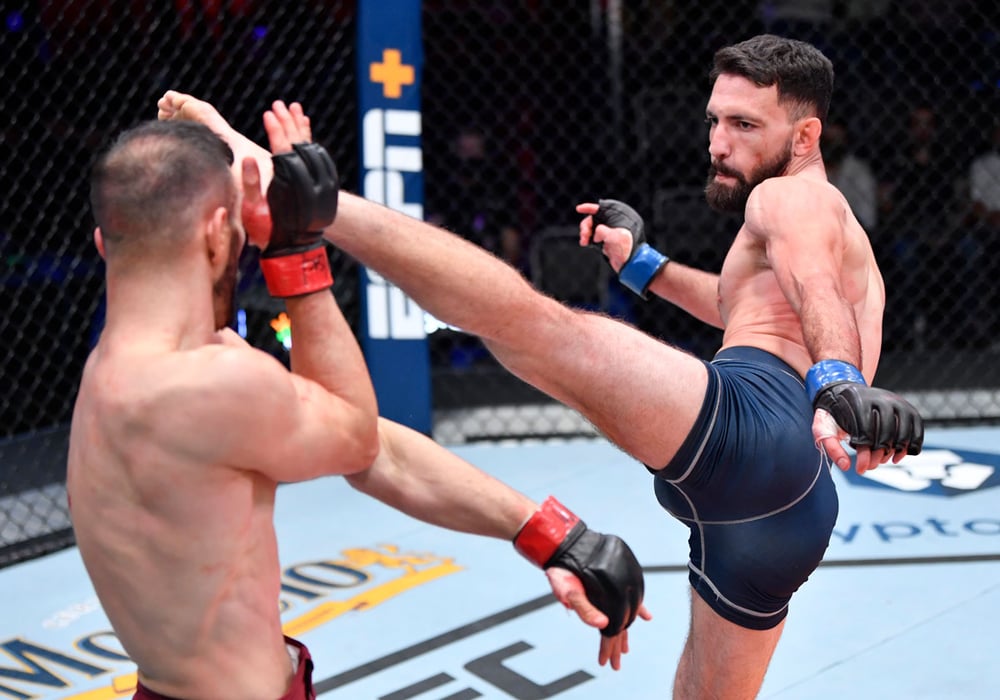
Javid led the way, amassing a 10-0 record on the regional circuit before competing in Season 5 of Dana White’s Contender Series. In this contest, he earned a third-round submission win over Oren Kahlon and a contract to compete in the UFC bantamweight division. A year later, Farid followed suit, turning up at the UFC APEX with a 9-0 mark before out-hustling Allan Begosso on Season 6 of the annual talent search competition to join his older brother in the ultra-competitive 135-pound ranks.
“I would say that being the younger brother, you constantly feel like you need to win the older brother’s approval,” offers Farid, who has posted consecutive wins over Da’Mon Blackshear, Kleydson Rodrigues, and Taylor Lapilus to move to 12-0 as a professional since joining the UFC ranks. “In some ways, my side of the competitiveness is that I’m trying to make my older brother go, ‘Alright, this kid ain’t bad; he’s not so bad after all.’
“Javid sets the blueprint, and I just follow his blueprint; I do what he’s done well and improve on what he could have done better,” continues the younger Basharat. “Experience is priceless, and although I don’t go through the experience he does, we learn from each other’s experience, good and bad.”
“It’s a big responsibility, and I had to carry myself in the training room a certain way,” Javid said when asked about setting the tone for his younger brother. “When he would do something extra, I had to do it with him, even when I didn’t want to do it because I had to lead by example.”
“When we’d run, I had to make sure that I beat him. Every time he beat my scores, I would have to forget about everything else and beat his scores, not just for my ego and my competitive nature, but because I had to set the example.”
SPARRING PARTNERS
While certainly not the case with all siblings who are close in age, the Basharat Brothers have always had someone to compete with and against. They’ve always had someone willing to embark on the next adventure and take on the next challenge without hesitation.
For Farid, it’s a reality that engenders appreciation, while Javid isn’t quite as sure how to feel about it, having never experienced anything different.
“I was speaking to someone after practice today because they were asking me about training in London and stuff, and I said, ‘We didn’t have much training in London, but what we did have was each other,’” explains the younger of the two UFC bantamweights. “I always say that with me and Javid, we could have been in any place — honestly, many of our early training was done in our back garden or in the park. As long as we had each other, we always had a training session.”
“It’s a thought-provoking question,” says Javid when asked about having his brother available as a constant training partner, taking a beat to figure out exactly how he feels about the situation. “People tell me to be grateful for that, but I don’t know how it feels to not have that; there has never been a time where I want to train, and he’s like, ‘No.’ I don’t know how the other side feels.”
“It’s a good feeling, I guess.”
It’s certainly an advantage that very few fighters possess. Still, anyone with a sibling knows there’s competition for everything: parental affection, chores, and even that last cookie in the jar. It’s this competitive spirit that begins to become part of their personality.
SIBLING RIVALRY
Although it’s great to always have someone willing to log rounds with you at the ready, the reality is that there are times when the competitiveness between the brothers can become too much.
As we speak, the pair live at American Top Team dorms, having decamped from Las Vegas to train at the all-star South Florida facility. Each is on their phone from their own rooms, which are not beside each other but instead stationed on either side of another visiting fight, as per their joint request.
“You caught us on a good week. A couple of weeks ago, we weren’t speaking,” says Javid, laughing.
“We’re in the ATT dorms right now,” offers Farid. “We’re neighbors, and in the morning, we’ll walk past each other without saying ‘Hi’ or anything.”
“D’you know what the crazy thing is. I specifically asked for one room between us,” responds Javid, volleying things back to his brother. “He can’t even be my neighbor.”
“I’m Room 8, he’s Room 10; we need somebody in between us,” adds Farid.
“There is a heavyweight between us,” says Javid, with the size of the individual separating them in the dorms seemingly like a choice, or at least a happy accident.
“It gets like this more in camp,” continues the elder Basharat, who suffered the first loss of his career last time out against Aiemann Zahabi in March and is slated to return on August 10 against Chris Gutiérrez. “Outside of camp, we’re not that bad, but in camp in particular, (it can get contentious) because we’re always trying to compete against each other.”
Though there are clearly high levels of competitiveness between the two, each is quick to acknowledge that they’re highly aware of not letting things ever get to a point where they hurt one another. Farid quickly points out a situation that tends to unfold from time to time between the two.
“If coach says, ‘Go light,’ light is very subjective,” he says with a smile, Javid listening intently. “He could be going 20 percent; I could be going 40 percent.
“I can’t remember who took offense to the other person’s power bar, but one of us took it further than they needed to, and then it was a little bit harder, a little bit harder until it was 100 percent and we’re going toe-to-toe like Wanderlei versus Cro Cop. And it was just simple drilling.”
COMPETITIVENESS IN PLAY
While the competitiveness between some siblings can lead to hatred and division, as hotly as Javid and Farid battle with one another, it undeniably comes from a place of love, respect, and pride.
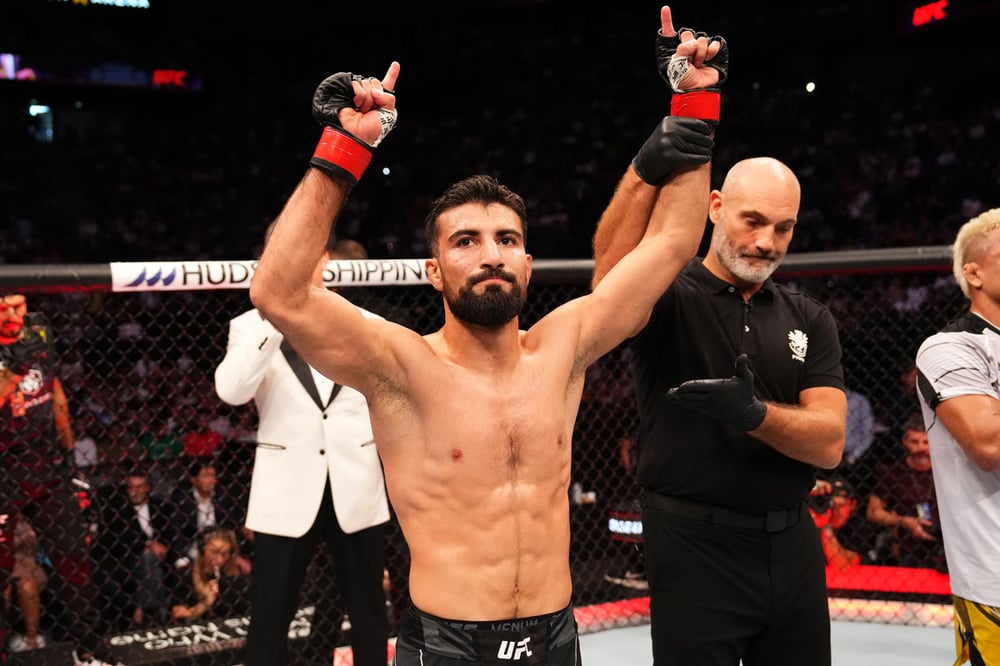
As much as several sibling tandems have competed inside the Octagon over the years, it’s still not a massive group. It’s less than 50 pairs in 30 years — and to be doing it alongside one another, in arguably the most competitive division in the promotion, with each currently residing in the Second 15 at bantamweight, is a tremendous achievement, and one neither brother takes for granted.
“At the end of the day — we can talk as much as we want about the bickering, this and that, but ultimately, the pride we have in each other far outweighs anything…,” begins Farid before his older brother interjects.
“Just to correct you there, Farid — I think that’s why the bickering and stuff happens so much is because we take so much pride in each other’s work,” offers Javid.
"Yeah — if we didn’t care, it’s whatever,” resumes the younger Basharat. "Other people have done far worse things — if Javid does something mildly bad, I’ll take far more offense because I don’t care about the other person the same way. With Javid, I’m like, ‘Nah, we’ve got to get it right; we’ve got to do this, got to do that.’
“In the bigger picture, we’re the only two fighters from Afghanistan on the UFC roster right now. We’re both currently very successful and working our way towards the rankings and then the belt, so we’re doing something special. I take huge amounts of pride in where we’ve come from. Like I said, we used to be training in the parks and back gardens, and now we’re competing in T-Mobile and all those big arenas.”
And when they compete in those various venues, one is always in the other's corner, which raises the forever intriguing question of whether it’s more challenging to be the one stepping into the Octagon or stationed on the outside, watching your brother go to battle.
“It’s a very different feeling,” begins Javid, who, like his brother, earned victories in his first three UFC appearances before a no-contest verdict in a clash with Victor Henry last year at UFC 294 and his March setback against Zahabi. “When you win a fight, don’t get it twisted, it’s the best feeling ever, but that whole process is way more intense when my brother is fighting, way more intense.
“I’m so much more on edge, even the weight cut. He’ll be the one cutting weight, and I’ll be the one suffering, making sure everything is (on track) and going smooth. The fight day, too — when you’re in the zone, you don’t think about the nerves or whatever. The winning feeling, it probably feels better for yourself because of the adrenaline or whatever, but that whole process is way more relieving when my brother wins. I get more relief out of his victories.”
“That’s the best way to put it,” adds Farid, building off his brother’s answer. “The process is far tougher when it’s the other person because when you’re doing it — when you’re fighting, you’re doing the weight cut — you know you’re in control; you’re in the driver’s seat.
“But when Javid is fighting, I’m like, ‘I hope he’s aware of this. I hope he’s not overlooking this. I hope he focuses on this.’ It’s that uncertainty of not being in control, being in the passenger’s seat, that makes it tougher.”
Still, it’s got to be nice to know that there is always someone ready and willing to ride shotgun with you at all times, even when they’re too annoyed to speak to you in the hallway.
BROTHERHOOD IN THE OCTAGON: RARE BUT UNYIELDING
Ultimately, the presence of brothers in MMA serves as a reminder of the unique bonds that can form through shared struggle and unyielding mutual support. Whether it’s the Tafa brothers stepping in for each other at a moment’s notice or the Basharat brothers pushing each other to new heights, these sibling duos bring an extra layer of narrative and emotion to the sport. Their willingness to face adversity together, to endure the grueling grind of training camps and the physical and mental toll of fights, speaks volumes about their resilience and commitment. The rarity of such partnerships only highlights their significance—offering a glimpse into the powerful dynamics of family ties, where loyalty, competition, and love intersect in the relentless pursuit of greatness. As they continue to carve out their legacies, these brothers not only enrich the sport with their talents but also with their stories, proving that in the unforgiving world of MMA, blood indeed runs thicker than water.










